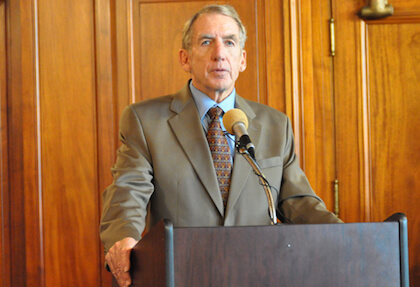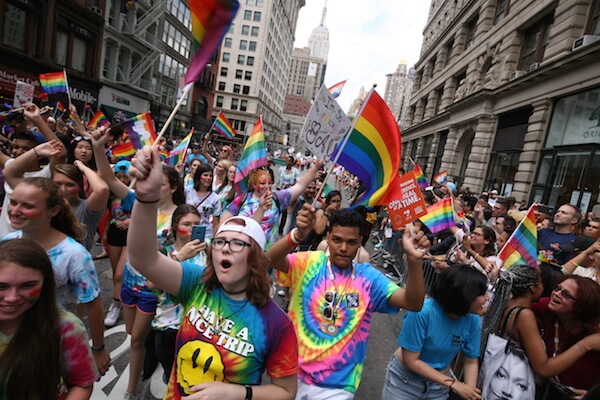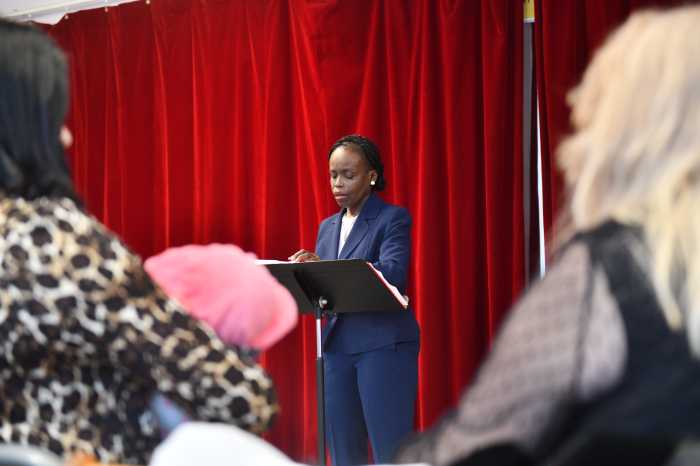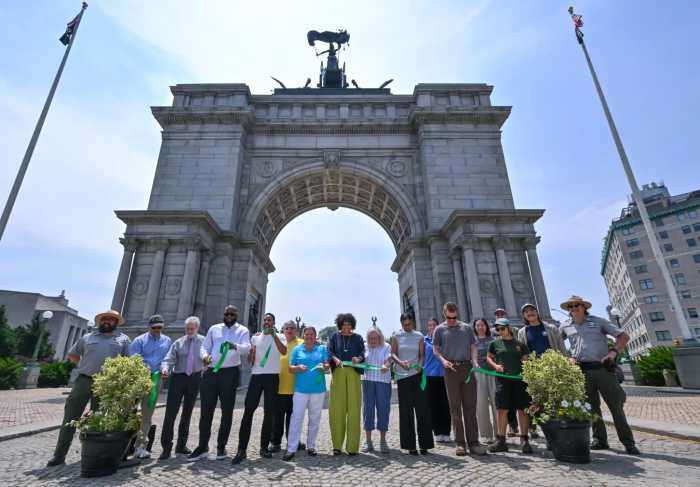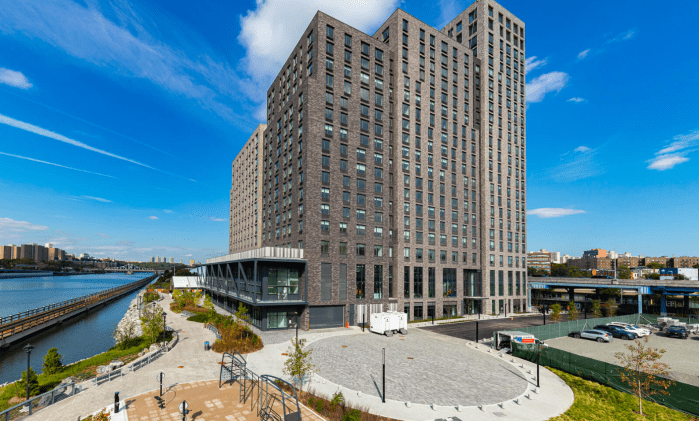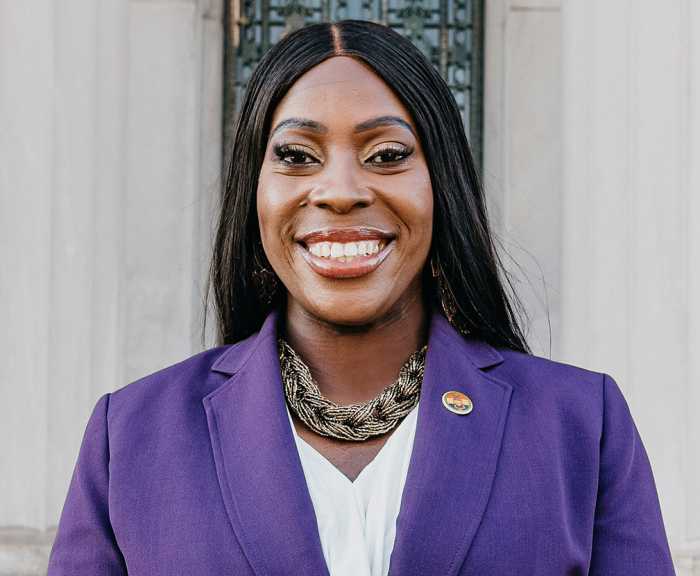David Boies and Ted Olson, lead attorneys on behalf of AFER, at a March 2010 TimesTalk forum in Manhattan. | COURTESY: SARA KRULWICH/ THE NEW YORK TIMES
The Supreme Court announced on December 7 that it would review the Ninth Circuit's Proposition 8 ruling and the New York-based Second Circuit's ruling on the constitutionality of the Defense of Marriage Act (DOMA), but in both cases it indicated it would hear argument about whether the petitioners had standing to seek review of the decisions.
The arguments in both cases will probably take place late in March, with opinions expected by the end of the high court's term in June.
The court made no announcement about the other pending certiorari petitions from DOMA rulings by the Boston-based First Circuit or by district courts in California and Connecticut. Nor did the Supreme Court say anything about a case involving Arizona’s efforts to rescind its public employees domestic partner benefits.
In the Prop 8 case, the Ninth Circuit ruled the 2008 voter referendum, which placed a different-sex-only definition of marriage into the California Constitution, violates the constitutional equal protection rights of same-sex couples because there was no rational basis to rescind the right to marry granted earlier that year by the California Supreme Court. Same-sex couples were marrying in California from mid-June 2008 through Election Day, when Prop 8 was enacted.
The initial challenge to Prop 8 went before the California Supreme Court, which held that its enactment was valid, though it also ruled that the marriages that took place prior to November were valid and would continue to be recognized. Its earlier state equal protection ruling required that same-sex domestic partnerships in California be treated by the state as equal to marriage for all legal purposes, that court found.
The American Foundation for Equal Rights (AFER) retained noted Supreme Court advocates Ted Olson, a former US solicitor general, and David Boies to challenge Prop 8 on behalf of two same-sex couples denied marriage licenses. After a trial held in the district court in San Francisco, Judge Vaughan Walker declared Prop 8 unconstitutional in a sweeping ruling that found that same-sex couples have a right to marry under the equal protection and due process clauses of the 14th Amendment. Because neither Governor Arnold Schwarzenegger nor Attorney General Jerry Brown, who is now governor, would defend Prop 8 against the lawsuit, Walker allowed the referendum’s Official Proponents to intervene as defendants.
The Proponents appealed Walker's ruling to the Ninth Circuit, which stayed his order pending the outcome of the case. The Ninth Circuit first held that the Proponents had standing to appeal Walker's ruling, after obtaining an advisory opinion from the California Supreme Court that initiative sponsors enjoy that right under state law. The appeals court then affirmed Walker, but on the narrower theory that no rational basis had been shown for the state to withdraw the right to marry after it had been granted.
In their petition to the Supreme Court, the Proponents posed the broader question –– on which the Supreme Court has now granted review –– of whether same-sex couples are entitled by virtue of the 14th Amendment to the same right to marry enjoyed by different-sex couples.
But the high court will revisit the question whether the Proponents have standing to represent the State of California in defending Prop 8. If the Court rules that they did not have standing to appeal Walker's ruling as a matter of federal law, that would mean that neither the Supreme Court nor the Ninth Circuit would have jurisdiction to decide their appeal. In that event, Walker's ruling, which was not appealed by any of the named defendants in the case –– such as the governor or attorney general –– would be the final ruling, binding in the state of California. Same-sex couples would once again have a right to marry there.
If the Supreme Court finds that the Proponents did have standing, it would proceed to consider the merits of the case. It could decide to answer the question on which it granted review –– whether California can reserve the status of marriage to different-sex couples –– or it could, if so inclined, accept the narrower reframing on which the Ninth Circuit decided the case and find that that Prop 8 violated the 14th Amendment because no rational grounds exist to rescind an existing right to marry, especially in a state whose Supreme Court had ruled that same-sex domestic partners were entitled to all the rights of marriage.
In other words, the December 7 action by the Supreme Court offers no guide as to how broad or narrow its final decision might be.
Edie Windsor after her June victory at the district court in New York. | DONNA ACETO
In United States v. Windsor, the Second Circuit ruled that Section 3 of the 1996 federal Defense of Marriage Act –– which bars federal recognition of otherwise legal same-sex marriages –– violates constitutional equal protection rights of such couples because the court found no important government interest was significantly advanced by treating them unequally to different-sex married couples.
Edith (Edie) Windsor, the plaintiff represented by the American Civil Liberties Union, is suing for a refund of taxes paid –– amounting to more than $360,000 –– on her inheritance of property from her wife, Thea Spyer, who passed away in 2009, several years after they had married in Canada. Surviving spouses don't have to pay taxes in that situation, but the Internal Revenue Service relied on Section 3 of DOMA as authority to demand the taxes and deny any refund. It was in the context of this case that the Justice Department and the Obama administration, in early 2011, determined that Section 3 was unconstitutional and declined to defend it on the merits.
Paul Clement, another former solicitor general, was hired by the Republican leadership of the House of Representatives –– acting as the so-called Bipartisan Legal Advisory Group (BLAG) –– to intervene and defend Section 3. After losing the case in the Second Circuit earlier this year, Clement filed a petition on BLAG’s behalf before the Supreme Court.
Donald B. Verrilli, Jr. , the current solicitor general –– the third holder of that office to turn up in this story, for those keeping score –– also filed a petition, stating its agreement with the Second Circuit's decision but asking the high court to take the case so there would be a clear ruling on Section 3's constitutionality with nationwide application. The Second Circuit's ruling is only binding in the handful of states making up that federal judicial circuit.
In granting the solicitor general's petition (not Clement's petition), the Court added two questions: First, in light of the solicitor general's agreement with the Second Circuit's ruling, did Verrilli have standing to appeal the case to the Supreme Court, and, second, does BLAG have such standing.
In both the DOMA and Prop cases, then, the Supreme Court added questions to those posed by the petitioners, signaling the possibility it could find it does not have jurisdiction to rule on the merits in either. Under the Constitution, the Court is limited to deciding actual “cases and controversies,” which it has construed to mean that only a party with a distinct personal stake in the outcome of a case has “standing” to bring their case to federal court. Plaintiffs must have standing to initiate a lawsuit, and appellants must have standing to appeal a trial court's ruling. If the petitioners in one or both of these cases don't have standing, then that case is not a real “case or controversy” for constitutional purposes and so is outside the court's jurisdiction.
As a result, the court’s December 7 actions raise all sorts of interesting questions that will probably keep scholars and commentators busy speculating from now until whenever the cases are disposed of. If the court finds that none of the petitioners have standing, it will dismiss these appeals. And, a ruling on standing also affects the jurisdiction of the courts of appeals. Presumably, a party that does not have standing to appeal to the Supreme Court also lacks standing to appeal a trial court's ruling to a circuit court of appeals.
That technicality would not affect the outcome in Windsor's case, since she won at the district and appeals court levels. She would be entitled to her tax refund in such an event. But her victory at the district court level would establish no precedent. And if the petitioners in the Windsor case lack standing, then the very same parties lacked standing in the First Circuit DOMA case, where the 1996 law was also ruled unconstitutional at both the district and appellate levels. The district court ruling in that case, then, might also only be binding on the particular parties and their individual claims for federal benefits.
At the end of the day, I don’t believe the Supreme Court will find that the US solicitor general lacks standing to bring these cases before it. The number of federal district courts that have ruled against the constitutionality of Section 3 is steadily mounting, more lawsuits are in the pipeline, and a nationwide resolution of its constitutionality is needed.
As a result, my conclusion is that the court will likely proceed to the merits on Windsor, and I think there is a good chance it will decide, by at least a vote of 5-4, that the lower courts are correct in holding it unconstitutional. The progress of the marriage equality movement may help to influence the court in reaching that conclusion. As of January 1, same-sex marriage will be legal in nine states and the District of Columbia, and if Judge Walker's ruling eventually goes into effect, in California as well. As the proportion of the country living in marriage equality states increases, the “anti-democratic” effect of a Supreme Court ruling on this issue decreases.
Arthur S. Leonard, a New York Law School professor, is the founding editor of Lesbian/ Gay Law Notes.




